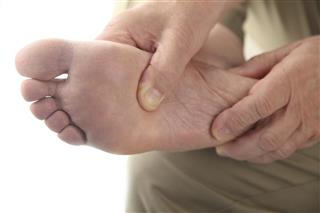
Often ignored as a trivial symptom, numbness in fingers could be an indication of underlying medical conditions; these may range from mild to severe and sometimes life-threatening.
Did you know that fingertips are among the most sensitive parts in our body? With a high concentration of touch receptors and thermoreceptors, fingers are used for a wide range of functions, including sensory ones. Sometimes, the fingers may lose sensation, a feeling which is referred to as numbness. This may happen due to minor causes like exposure to cold, or holding a posture for a long duration. However, the underlying cause may not be minor always, especially in those who experience persistent and/or severe finger numbness.
What does numbness feel like? Numbness may occur in any part of the body, but mostly it is felt in the fingers, hands, arms, legs, and feet. Otherwise known as paresthesia or sensory loss, numbness is partial or total loss of sensation. It can also be accompanied with tingling, prickling, or burning sensations. Some people describe the feeling as pins and needles. Sometimes, pain may also develop along with numbness. The causes for this symptom may or may not be linked to fingers directly. While finger injuries, like bone fractures cause numbness, injuries of the neck may also cause this symptom. In the latter case, fingers are not directly involved. Numbness in fingers can be caused by various reasons, that may range from mild to severe in nature.
What Causes Numbness in Fingers?
Numbness is most often associated with nerve damage. It is the function of the nerve cells to carry sensations from various parts of the body to the brain and vice versa. Any damage caused to the nerves can affect their functioning, which in turn results in numbness or tingling sensation in the corresponding body parts. Usually, finger numbness is associated with nerve damage caused by diseases, pressure, or entrapment. Any damage to the upper spinal cord or the nerves in the arms may cause numbness in the wrists, hands, and fingers. The exact location of numbness and associated symptoms must be taken into consideration, while diagnosing the condition. The following are some of the common causes of numbness in fingers.
| This is a medical condition in which the median nerve gets compressed at the wrist, where it enters the palm through the carpal tunnel. The nerve that emerges out of the carpal tunnel, branches out to the thumb, index finger, middle finger, and one half (vertical) of the ring finger. So any damage to this nerve can cause numbness in these fingers. Symptoms and Location: Numbness and tingling in fingers and arms are the initial symptoms of this condition. The symptoms may aggravate during nighttime. As the condition worsens, the person may develop symptoms, like pain, cramps, burning sensation, and weakness in the palm, fingers, and arm of the affected hand. In this case, the median nerve is compressed and so, the thumb, index finger, middle finger, and one half of the ring finger (side that is adjacent to middle finger) are affected. The area of the palm that corresponds to these fingers may also develop numbness. Causes: The median nerve can get compressed due to various reasons including injuries, repetitive stress, and certain medical conditions. Carpal tunnel syndrome is said to be common in those, who use computers on a regular basis, that too for very long hours. Even others, who use their wrist and fingers regularly can get affected with this condition, due to repetitive stress on the wrist. It is also linked to medical conditions like osteoarthritis, hypothyroidism, diabetes and mental stress. |
Ulnar Nerve Entrapment
| In this case, the ulnar nerve gets trapped and compressed, causing various symptoms, like numbness and pain in fingers. As in case of the median nerve, the ulnar nerve too passes down the arm and enters the wrist. But, the point of entry to the palm is different in both cases. The ulnar nerve travels through that part of the wrist that corresponds with the base of the small finger. The nerve may get trapped at the elbow or the wrist, causing different symptoms, including numbness in fingers. Symptoms and Location
Causes: As in case of carpal tunnel syndrome, ulnar nerve entrapment is also caused by trauma, repetitive pressure, or medical conditions. Direct injury to the nerve, regular activities that involve bending or twisting of wrists and elbows for long durations, and bone damage (caused by arthritis, fractures, etc), can cause this condition. Diabetes and hypothyroidism are also linked to ulnar nerve entrapment. |
Peripheral Neuropathy
| The condition can be defined as the damage to the nerves, that carry messages to and from the brain, and the resultant malfunctioning. Peripheral neuropathy can cause various symptoms. In fact, this is one of the common neurological causes of numbness in fingers, hands and feet. The symptoms may vary with the type of nerves affected. Symptoms
Causes: Peripheral neuropathy can be caused by various reasons and diabetes is one among them. Others include regular and excessive alcohol consumption, some autoimmune diseases, and infections. Low level of vitamin B12, heavy metal poisoning, chronic kidney disease, and liver diseases can also cause nerve damage and lead to peripheral neuropathy. |
Multiple Sclerosis
| An autoimmune disease, multiple sclerosis is mostly found in women. In this disease, the covering of the nerves (myelin sheath) gets damaged due to inflammation. It is said that the nerve cells are attacked by the immune cells of the body, thereby causing inflammation, and the resultant damage to the spinal cord, brain or optic nerve. Symptoms
Causes: Though there is no conclusive cause for this condition, it is believed that genetic factors, viral attacks, and environmental factors may trigger the symptoms. Low vitamin D level is also linked to multiple sclerosis, as the disease is common in those residing in locations that are far from equator. |
Cervical spondylosis
| Cervical spondylosis is a condition that is usually caused by the wear and tear of the cervical spine (spinal discs in the neck). As the condition worsens, the nerves that pass through that location can get compressed. Even other parts of the spinal cord may get affected. Symptoms
Causes: Though aging is cited as a common cause for cervical spondylosis, there are various contributory factors. They include arthritis, neck injury, osteoporosis, etc. Those who are obese and those who lift heavyweights regularly, are more prone to develop this condition. |
Other Causes
| Inhalation of Toxic Chemicals: In the long run, regular inhalation of some chemicals can cause finger numbness, tremors, muscle cramps, headache, etc. One example is long-term inhalation of smoke emitted from burning acidic dry cell batteries, that contain toxic chemicals. Poor Blood Circulation: Insufficient or total blockage of blood supply to the fingers can cause this symptom. This may occur in those with peripheral artery disease or narrowing of arteries (that supply blood to extremities) due to accumulation of fat. Blood supply to the extremities can be blocked in case of frostbite too. This can also lead to tissue damage and numbness in the fingers. Another such condition is Raynaud’s phenomenon, which causes narrowing of blood vessels to the fingers and toes, thereby causing numbness and tingling. Stroke: Brain damage caused by a mini stroke or stroke can also cause finger numbness. Such numbness is often felt on one side of the body, especially in the arms, hands, and fingers. Apart from numbness, a stroke can cause symptoms, like dizziness, sudden headache, vision problems, difficulty in walking, weakness, etc. Nerve Tumor: Tumors on the nerves in the neck, arms or wrists may also cause numbness and tingling sensation in the fingers. Other causes include metal poisoning (like lead poisoning), systemic lupus erythematosus, transverse myelitis, shingles, leprosy, thoracic outlet syndrome, vasculitis, and hypothyroidism. Even migraines are sometimes said to cause finger numbness. |
Most of the finger numbness causes are not emergency conditions that require immediate medical attention. However, the underlying cause could be a life-threatening condition like stroke or severe trauma. If numbness in fingers is accompanied with the following symptoms, you must proceed to the emergency room, as soon as possible.
- Severe headache
- Numbness radiating to the entire arm
- Confusion
- Change in vision
- Severe fatigue
- Loss of control over bladder and bowel movements
- Difficulty in walking, moving, and speaking
This is only a brief overview about some of the possible causes of numbness in fingers. Sometimes, those who have undergone surgery of the cervical spine may also experience this symptom. Use of certain medication, deficiency of potassium and calcium, and stress, are also linked to finger numbness. If the symptom is persistent and/or severe, consult your doctor at the earliest. The mode of treatment for numbness in fingers may vary from one patient to another, on the basis of the underlying cause. Apart from medication, occupational and physical therapy, and exercises may be suggested. In some cases, surgery is also recommended.
Disclaimer: This article is for informational purposes only and should not be used as a replacement for expert medical advice. Visiting your physician is the safest way to diagnose and treat any health condition.




